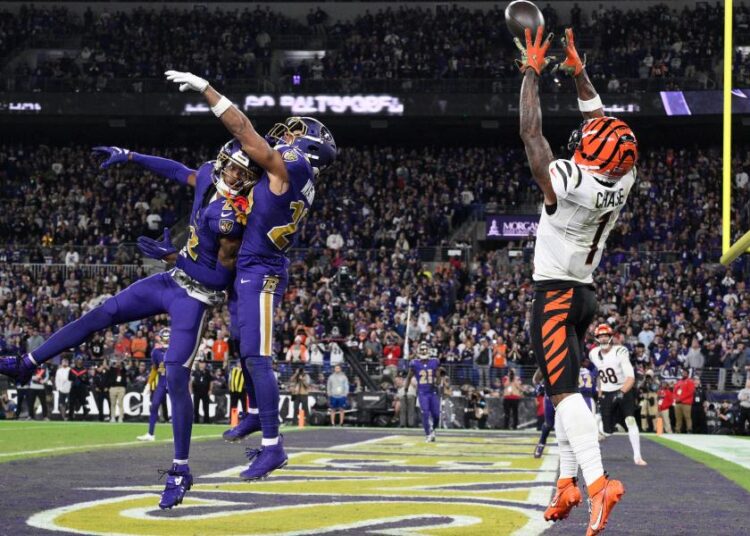As we career at high speed into the second half of the season, even the best NFL teams have issues they need to shore up before the playoffs. Because in the postseason every mistake is magnified, and every big play is bigger.
So, here are five of the NFL’s most credible contenders, and the one potentially fatal flaw that could boot each one of those squads out of the race to Super Bowl LIX. The list is far from exhaustive – there are plenty of other teams who could win the title – feel free to add your own choices, and their weaknesses, below.
Kansas City Chiefs (9-0)
Weakness: A lack of explosive offensive playmakers.
The Chiefs are like Bill Belichick’s best New England teams – no matter what weakness you think you can exploit, they’ll develop another part of their game to beat you instead. And that’s why these Chiefs are undefeated. But they’re undefeated despite a severe lack of explosive plays, especially in the passing game. This season, Patrick Mahomes has just four completions of 20 or more air yards on 14 attempts for 168 yards, three touchdowns, three interceptions, and a passer rating of 77.1.
Related: Angry teammates and redemption: NFL week 10 showed kickers matter
To put that into perspective, Jordan Love of the Green Bay Packers leads the NFL with 15 such completions, and only two qualified quarterbacks – Jacoby Brissett of the New England Patriots and Deshaun Watson of the Cleveland Browns – have fewer than Mahomes. Neither Brissett nor Watson are starters on their own teams.
Mahomes has much more going for him than Brissett and Watson, and the Chiefs’ run game, defense, and special teams are keeping them afloat. But there has to be some concern in Kansas City about the lack of playmakers who can set opposing defenses on edge when it really matters. If the Chiefs go up against a more explosive offense in the postseason, and Steve Spagnuolo’s excellent defense can’t counter, what will the Chiefs’ response be?
Detroit Lions (8-1)
Weakness: A pass rush that may not be good enough.
It’s hard to bet against the Lions after they overcame a 23-7 half-time deficit and Jared Goff’s five interceptions to beat a very game Houston Texans team on Sunday night. But as we’ve said, we’re talking about the playoffs. And in the playoffs, any flaw will be magnified. For the Lions, it’s a pass rush that has obviously suffered since elite edge-rusher Aidan Hutchinson suffered a broken tibia and fibula in Week 6. With Hutchinson, the Lions had 18 sacks. In his absence, they’ve managed just nine.
The Lions’ pressure rate is actually slightly better without Hutchinson, but that’s because defensive coordinator Aaron Glenn has dialed up blitzes at a much higher rate – from 31.6% to 38.9% of their defensive snaps coming into the Texans game. That’s all well and good, but blitzing at a higher rate makes you more vulnerable because there are fewer players to cover receivers. And when a defense has fewer sacks from more pressures, that tells you that defenders aren’t getting to the quarterback as often. Yes, pressures are also important, but sacks stop the play.
The recent trade for edge defender Za’Darius Smith may fill in the crater left by Hutchinson’s departure to a point, but if it doesn’t, that defense could be much more vulnerable to high-level passing games as the season progresses. Head coach Dan Campbell’s optimism has done wonders, but it can’t put quarterbacks on the ground.
Buffalo Bills (8-2)
Weakness: Having to build the whole plane out of Josh Allen … again.
Buffalo’s Sean McDermott should be considered for coach of the year, because this was supposed to be a rebuilding season for the team. Instead, these Bills look as dangerous as anyone when everything’s working. A defense with many new parts and an entirely new secondary has clamped down pretty well, and the offense with Allen can be a serious problem for any defense.
But throughout the Allen era, which really began in 2020 when he raised his game to the highest level, the Bills have tended to rely on their quarterback too much. This season is no different. James Cook and Ray Davis are decent running backs, but Allen has been the team’s best rusher for years. And as much as Allen can win games as a passer, he hasn’t had an alpha receiver in a long time. This season, the trade for former Browns receiver Amari Cooper has helped a bit, but first-round rookie Keon Coleman is still struggling with consistency, and the best receiver on the team is slot maven Khalil Shakir.
There’s no question that this is a brilliantly coached team on both sides of the ball, but relying too heavily on Allen has stopped the Bills from their Super Bowl goals over and over in recent years – usually at the altar of the Chiefs. And while Allen wouldn’t be the first quarterback to go on a thermonuclear streak in the playoffs to nab a Lombardi Trophy, that’s a lot to expect – no matter how good that quarterback may be.
Pittsburgh Steelers (7-2)
Weakness: What if Russell Wilson is a mirage?
The one thing you’ll hear above all else when it comes to Steelers head coach Mike Tomlin is that he’s never had a losing season, and this is his 18th year at the helm. That’s a remarkable record. But Tomlin has had to paste things together at quarterback over the last few seasons, basically ever since Ben Roethlisberger started to decline in his final years with the Steelers.
The 2024 Steelers bypassed the draft to solve their quarterback problem and instead traded for Justin Fields, and signed Wilson after he was released by the Denver Broncos. Fields was seen as a raw quarterback who needed the right environment, and Wilson was perceived to be the veteran whose best days were past him. Tomlin began the season with Fields as the starter, but went with Wilson instead in Week 7.
Since Wilson became starter, the Steelers are averaging 30.3 points and 382 yards per game, as opposed to 20.7 points and 298 yards per game with Fields. Offensive coordinator Arthur Smith seems to understand what the Wilson offense has to be – a dynamic run game, with Wilson’s deep-ball shots off play-action. That’s what worked for Wilson in Seattle, and that’s what Sean Payton didn’t give him in Denver.
This could propel Pittsburgh to a place it hasn’t been in a while … but Wilson is also known to break down for stretches, and if he doesn’t stay within himself, the Steelers could easily be back to relying on defense and special teams to scrounge them wins.
Baltimore Ravens (7-3)
Weakness: A defense that is falling apart.
In 2023, the Ravens had the NFL’s best defense by pretty much every measure. They led the league in FTN’s Defensive DVOA, a metric that tabulates opponent-adjusted efficiency. They led the NFL in fewest points allowed at 280. They tied with the Browns and the New York Jets for the league’s lowest yards per play average at 4.6. They allowed a league-low 19 passing touchdowns, and they had 15 interceptions. Only the Detroit Lions and the San Francisco 49ers had more total pressures than Baltimore’s 308. This was an utterly dominant unit from front to back.
Now, without former defensive coordinator Mike Macdonald, who left to become head coach of the Seattle Seahawks, and with rookie DC Zach Orr as his replacement, the Ravens rank 16th in Defensive DVOA. They’ve allowed the NFL’s third-most points at 253. They’ve allowed 5.7 yards per play, tied with the New York Giants and Patriots for fourth-worst in the league. They’ve allowed 22 passing touchdowns (the most in the league), and they have just six interceptions. Last season, opposing quarterbacks managed a passer rating of 77.9 against Baltimore’s defense, behind only the New York Jets. This season, they’ve allowed a passer rating of 102.0, which is sixth-worst.
The Ravens are still a Super Bowl threat because their offense is firing on all cylinders, and Lamar Jackson may well win his second-straight MVP and third overall. But, at this rate, the Ravens offense will have to carry the defense for the rest of the season.
Read the full article here



























Discussion about this post